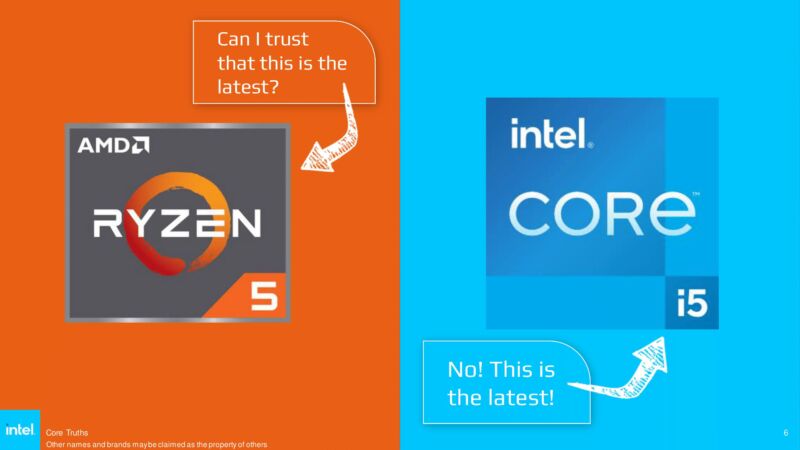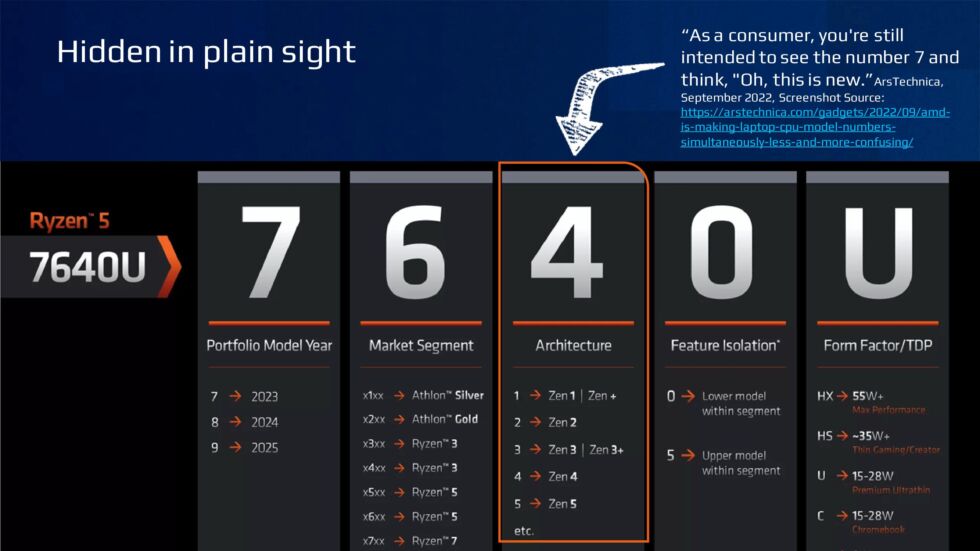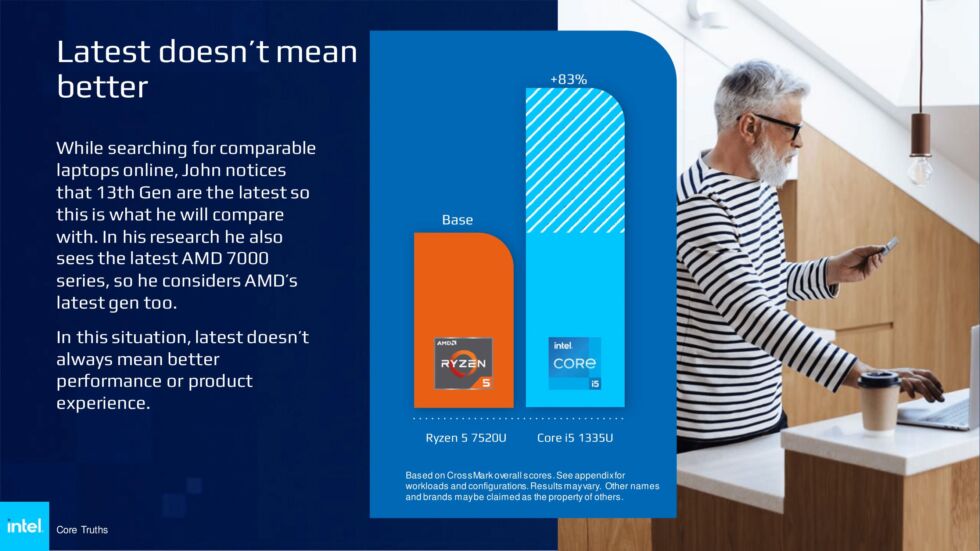
AMD changed the way it numbers its Ryzen laptop processors last year, switching to a new system that simultaneously provides more concrete information than the old one while also partially obfuscating the exact age of the various CPU and GPU architectures being mixed-and-matched.
For instance, a knowledgeable buyer can look at the "3" in the Ryzen 5 7530U processor and determine that it uses an older Zen 3-based CPU core. But a less-knowledgeable buyer could be forgiven for looking at the "7000" part and assuming that the chip is significantly newer and better than 2021's Ryzen 5600U, when in reality the two are substantially identical.
Intel came out swinging against this naming scheme in a confrontational slide deck this week—now deleted, but preserved for posterity by VideoCardz—where it accuses AMD of selling "snake oil" by using older processor architectures in ostensibly "new" chips.
The "Core Truths" deck takes particular issue with the Ryzen 7020 series, released in late 2022 and into 2023 but using Zen 2-based CPU cores that date back to mid-2019. Intel argues, not inaccurately, that a 13th-generation Core i5-1335U chip can perform much better than a Ryzen 5 7520U, despite both being marketed as recent releases.

My first reaction was to basically agree with Intel's overall point; this was easy to do since the company used something I wrote to back up its argument. To quote myself in full:
"[If] you think it's a problem that similar-looking model numbers can be used for CPUs with totally different capabilities, the new numbering might be a bit worse [than the old numbering]," I wrote. "As an enthusiast, I could tell you that a hypothetical Ryzen 5 7630U is a rebranded 5000-series chip and that a Ryzen 5 7635U is a rebranded 6000-series chip. But as a consumer, you're still intended to see the number 7 and think, "Oh, this is new," even though Rembrandt comes with big boosts to GPU performance and power efficiency compared to Barcelo."
My second reaction, arrived at almost simultaneously, was to wonder why Intel was taking so much issue with a practice that Intel itself regularly uses to "refresh" its processor lineups.
Take that i5-1335U. Intel is right that it uses the company's most recent CPU architecture, codenamed Raptor Lake (the next-gen Meteor Lake is around the corner, but it's not here yet). What Intel neglects to mention is that, in most cases, Raptor Lake is merely a new name for the Alder Lake architecture used in 12th-generation processors. The Core i5-1355U is nearly identical to the Core i5-1255U, aside from some mild clock speed boosts to the CPU and GPU.

"Rebranding old technology to make it seem newer" is a trick that practically all big chipmakers have resorted to at one time, and Intel has a particularly rich history with it. The mid-to-late-2010s manufacturing problems that lost Intel its chipmaking technology lead also resulted in a whopping five generations of chips that all used some variation of the same Skylake-based CPU and GPU architecture. Performance kept increasing throughout this era as Intel bumped up clock speeds and added more cores, but these were much more gradual improvements than what we had gotten used to in the mid-2000s into the early 2010s.
And Intel's technology reuse isn't all in its past, either. Its 13th-generation desktop GPUs only improved on the 12th-generation models in small ways, and the 14th-generation desktop chips are nearly identical to the 13th-generation. Intel used the same basic Iris Xe integrated GPUs in three successive generations of laptop chips without making any improvements of note.
There's nothing inherently wrong with a company reusing its technology, as boring as it sometimes is for reviewers and enthusiasts to have to take so many looks at so many incremental iterations on the same basic tech. Intel needs to serve its PC-making partners, and those partners demand new chips so they can keep making and selling new things; the market demands newness, regardless of whether these products are truly new or simply "new" in quotation marks. But for Intel to complain about AMD's practices here feels particularly unearned and petty.
And of all the AMD processors to complain about, the Ryzen 7020 series isn't even the worst offender, given that it pairs the old Zen 2 architecture with a newer manufacturing process and an RDNA 2-based integrated GPU—its CPU cores are based on an older design, but there's a lot about the processor that actually is updated.

As Intel points out, mixing new technology in with the old doesn't necessarily make the 7520U's CPU competitive (both the 7520U and i5-1335U appear in laptops that start in the $400–$500 range on many retail sites, and Intel's chip will thoroughly outrun AMD's, especially in multi-threaded tasks). I wish that AMD would commit to refreshing its laptop chip range in a more consistent way since it would be less confusing and keep people from ending up with what is a more-or-less 5-year-old processor performance in a brand-new laptop.
But if Intel has a problem with repackaging old technology and selling it as new, the company should consider looking inward before complaining about what others are doing. To gripe about AMD's practices just weeks after releasing the barely updated 14th-generation Core desktop processors—maybe Intel should move out of its glass house before it starts throwing rocks.
reader comments
82